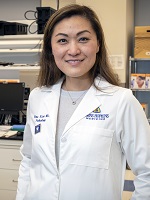Evolving and Emerging Biomarkers: Immunoglobulin and T-cell receptor gene sequencing: Recent Findings, Laboratory Considerations, and Clinical Implications

Immunoglobulin and T-cell receptor gene sequencing: Recent Findings, Laboratory Considerations, and Clinical Implications
This webinar is a recorded presentation of a live broadcast and includes a pre-test, the presentation, handout, audience Q&A, and a post-test.CME/CMLE Credit is not available for this webinar.
Description:
B-cells and T-cells have the unique characteristic of undergoing DNA rearrangement of the immunoglobulin or T-cell receptor gene loci, respectively, in order to differentiate into mature lymphoid cells. The genetic mark of these rearrangements separates these cells from all other cell types in the body, which maintain an intact germline configuration of these genes. The identification of specific rearrangements, initially by Southern blot and later by PCR, has enabled the use of B-cell and T-cell clonality as a diagnostic test for lymphoid malignancies. The development and application of next-generation sequencing to these genes has opened new avenues for minimal residual disease monitoring, immune repertoire profiling and precision immuno-oncology, as well as opportunities for non-invasive cancer diagnostics. The history and discovery of these genes, sequencing techniques used to identify these rearrangements, and the clinical applications of next-generation sequencing of these genes will be reviewed.
Learning Objectives:
- Identify genes targeted for clonality assessment in lymphoid malignancies.
- Compare sequencing techniques used for clonality assessment.
- Describe diseases for which immunoglobulin sequencing can guide patient management.
- Describe diseases for which T-cell receptor sequencing can guide patient management.
 |
 |
|---|---|
|
Speaker:
Rena Xian, MD |
Moderator:
Lauren Ritterhouse, MD, PhD |
Duration: 1 Hour
This program has been supported through educational grant funding provided by Amgen and Loxo Oncology at Lilly (for further information concerning Lilly grant funding visit www.lillygrantoffice.com.) Supporting companies had no control over its content. No personally-identifiable information regarding you is provided to any grant supporters.
- Click the "Register Now" Button
- Log in using your AMP credentials. If you do not have an AMP account, Create a FREE account.
- Complete the "Demographic questionnaire for Emerging and Evolving Biomarkers Series" before the webinar date. You will only need to do this once for the entire series.
All sales are final. No refunds will be issued.
No digital files may be reproduced or transmitted in any form, by any means, electronic or mechanical. By purchasing a product, you agree to not share any of the course materials, including videos, downloadable slide presentation.